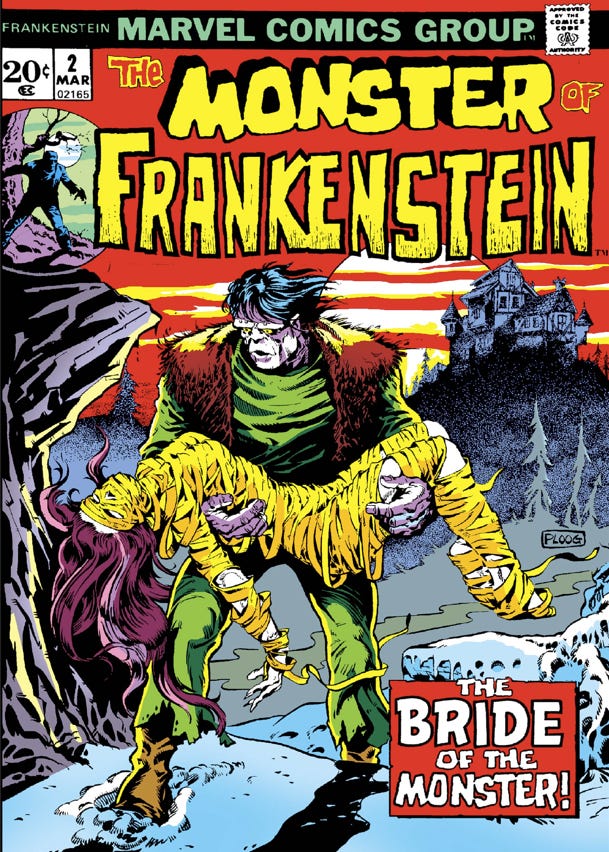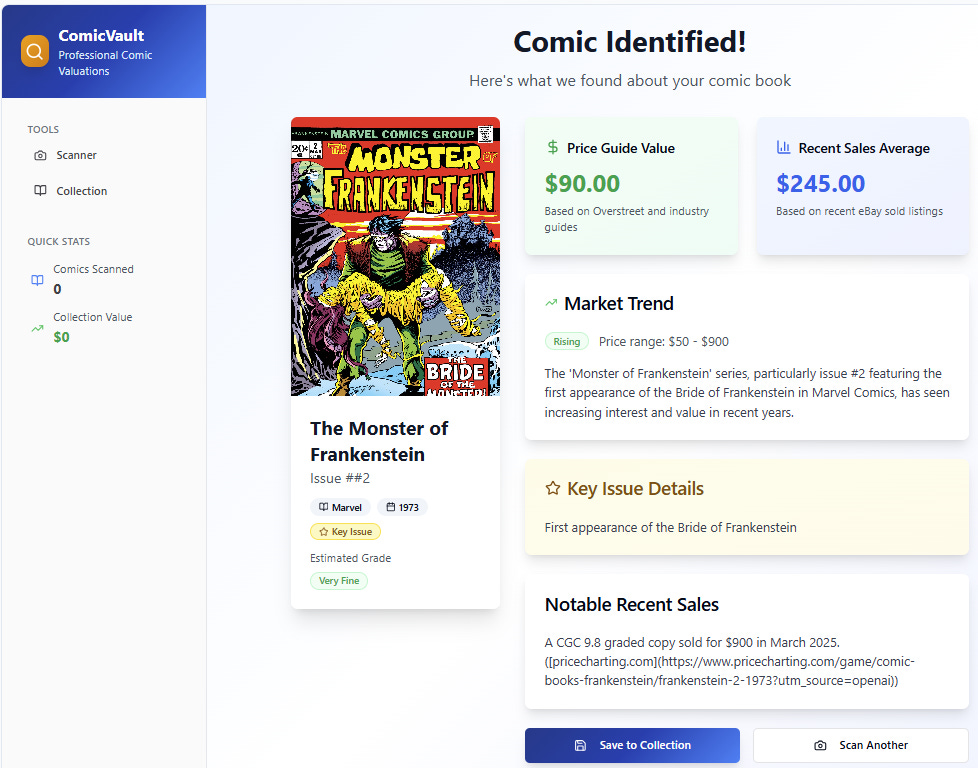I love comics.
I’ve long wanted to create an app called Trovr. It would take a picture of any comic book, judge the condition (as much as possible from the cover), research all online resources, and give you both the Overstreet or book value, and the last known sales figures for the book, so you can get a real, verified price on the fly.
Imagine being at a flea market and stumbling on a pile of old comics, 12-cent issues, unusual covers. If you don’t have that encyclopedic knowledge, how do you know if you have any hidden treasures?
Or, better yet, arming my parents, who frequent estate sales and swap meets, with said app, better to help guide them to gems.
I talked with image recognition software experts, I roped in a partner, I recruited a team of devs to build it. We never secured the funding so the plans sat in my file of uncompleted partnerships and projects.
A couple days ago I heard about Base44, which uses generative AI to code apps. “Vibe coding,” they call it. Describe what you want to build, and it designs the software structure, codes the pieces, and gives you a ready-made app to publish.
Base44 was built, essentially, as I understood it, by one guy. And it just sold for $80 million.
And so I sat down at Base44’s website and described my app.
Twenty minutes later, there it was. Fully functional. Camera app included. It built a database to store my collection without me even asking for it.
Twenty. Minutes.
Here are the apps I’ve built so far. One is for comics, one is for antique cars (my dad is a voracious collector and restorer), and one is based on a Substack post I just saw about a dude who wants to code an app that researches the terms and conditions you sign away with any product, video game, software, and tells you what you’re giving up or agreeing to, without reading the fine print.
Naming convention not mine, apparently gen AI and Base44 apes the conflation of two words with no space between as standard app naming.
I have a Plex video server that I have populated with years of video files of cult movies, horror stuff, out of print TV series, old SCTV episodes, every Jess Franco and Jean Rollin movie.
Want to watch anything from Roger Corman’s New World? Humanoids from the Deep? Private Duty Nurses? Boxcar Bertha, directed by one Martin Scorsese? It’s all there. It’s my own private Netflix.
I have Spotify, Apple Music, Rhapsody née Napster, on which I can listen to most publicly available music, the ultimate celestial jukebox.
If you want to be like Meta and indulge in the ultimate “online library,” Anna’s Archive, which is actually a gigantic torrent site of every ebook ever published, is free and available.
Meta engineers scraped all the books there and fed them into their generative AI engine, effectively moving fast and breaking things in the race to be the winner in the AI race.
So much for writers getting paid, even when it’s already impossible for a writer to get paid.
And yet, with this embarrassment of riches, this seeming abundance, why am I lying flat on my back, reading a physical copy of my friend Alex Johnson’s new book Brooklyn Motto?
Well, one, it’s a good book.
Two, I paid for it!
Three, it’s a physical entity. It has weight and heft and matte finish printing on the cover and nice typography and it’s altogether so much easier to read a print book than scan a pdf on my iPad, or even an ePub or .mobi or Kindle file.
Reading a pdf is torturous. The whole experience is counter- intuitive. Dense, dull images, scrolling up, no pagination, like getting your news on bog roll.
OK OK, old man yelling at cloud.
But this abundant accessibility. This incredible ease of use. This instantaneous creation with no forethought or talent. What to make of it?
A recent study in Nature found that using generative AI makes humans more productive, but dulls intrinsic motivation.
And another recent study from MIT Media Lab published earlier this month found that using large language models can create “cognitive debt.”
Cognitive Debt - the idea that solving a math problem without doing the work to get there leaves a blank spot where knowledge used to be.
“Cognitive Debt is where you forgo the thinking in order just to get the answers, but have no real idea of why the answers are what they are.”
Cheating on a test to get a passing grade, yet retaining none of the knowledge.
Is ChatGPT rotting our brains?
I would expand this to a larger idea: the over-simplification and accessibility of the world has stunted its level of ambition, learning and achievement.
YOU CAN WATCH ANYTHING YOU WANT!
I don’t know what to watch. I can’t pick. I don’t want to waste my time on some shitty movie. I already did that for an hour with the new Mission Impossible.
Which Rose called “Mission Impossible To Watch.”
I could start at the beginning of the library alphabetically but I already did that and by The ‘Burbs I realized it was mostly crap.
I don’t know what to listen to. I want to go back to a record store with cool folks behind the counter who know everything about everything and tell me I really need to check out this new record by this band The New Pornographers, like Andee or Windy at Aquarius Records did once upon a time.
Discovery. Curation. These tools are absent, revenue-motivated, or facile at best, in the world of streaming.
I want to build something with my hands. I want to embrace the tactile, even if it’s digitally tactile.
I feel like writing this newsletter is some of the most real work I do, because it forces me to draw abstract ideas from the nether regions of my information-overstuffed cognita and, through endless purge sessions of ideas, usually late at night, pounding away at OneNote on my phone before the ideas are just phantoms in the morning, somehow I can gather all these essences together in a misshapen stone block and start carving away until I find something meaningful.
This has been an era for me of unleashed creativity, and simultaneously of bankrupt value.
I made a RedBubble store and populated it with t-shirt designs I thought were very funny, mostly because I used to have a website called dudewithachapmanstick.com which people seemed to think was hilarious. It was just a collection of pictures of dudes who desperately wanted to be Tony Levin of King Crimson. All men.
I used gen AI to help me draft a guide about what to do in case of an EMP attack (electro magnetic pulse, which short circuits all electronics and effectively plunges us into even darker ages). I published it using Kindle Direct Publishing. I ordered physical copies of my “book” and sent one to my parents.
I have a second book in the wings which is unfortunately a little too close to the bone at the moment, about what to do when war happens on our shores. I called it “When The War Comes Home.” I have not published it.
Nobody seems to really care for any of these products. I mean, sure I sold a handful of t-shirts, but with RedBubble’s take it’s not even resulted in a check yet.
And the experience has left me feeling more empty. This took very little work, and therefore shows in the complete lack of pride and ambition I feel to publicize it.
Meanwhile, I am very rightly proud of holding myself to a fairly consistent publishing schedule.
The hours show, the work shows.
Angela Duckworth, in her book Grit, writes “…what we eventually accomplish may depend more on our passion and perseverance than on our innate talent.”
Mere talent isn’t enough. Talent will get you to the show. Sticking around and arriving early and staying late is how you get lucky enough to win.
Generative AI represents talent without the passion, perseverance, grit, learning, ambition, drive, and luck.
Mere talent is mediocre.
And if, as in software development, “perfect is the enemy of good,” mediocrity is the enemy of everything.
Thanks for reading! Hit me up at nicholas@areyouexperienced.co if you want to chat with me.
Some new news on the employment front for your humble narrator:
I am fractionally taking on the role of Chief Operating Officer for Sanctuary PBC, an incredible organization that has developed software which finds emergency housing for victims of domestic abuse, and other displaced persons. I’m helping them build a solid business platform, recruit some new faces, and generally being my OPS self.
Meanwhile! I am also, fractionally, taking on the mantle of Head of Marketing of Hall Donovan. Hall Donovan is a cybersecurity consultancy run by a good friend of mine, and I’ve been tasked with helping them expand their reach.
I will bifurcate my brain appropriately.
Never fear! I will continue to publish this thing until it kills me. I will have to stop then, because I don’t have a backlog of unpublished material in any kind of shape.
With love, from South Austin, Texas.
This thing is entirely supported by you guys. Anything is appreciated.









"Generative AI represents talent without the passion, perseverance, grit, learning, ambition, drive, and luck. Mere talent is mediocre."
This is also seen in countless extremely skilled, practiced guitar players. They can shred all day long, play almost anything, but it is emotionally inert and like watching a magician do a complicated card trick or sleight-of-hand. You aren't moved, you just think "Wow, that probably took a lot of practice."
Talent isn't unimportant, but if punk and late 20th century art taught us anything, it is that those other characteristics you list -- passion, etc. -- and good or new ideas matter more.
Generative AI has no passion, and it has no good or new ideas.
Thank you for the plug, old friend.